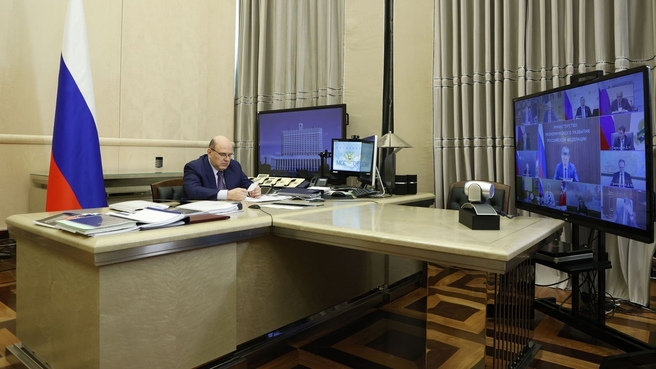Mikhail Mishustin’s opening remarks:
Good afternoon, colleagues,
The government continues to work on solutions to strengthen Russia’s economic stability. Proposals for emergency measures have already found their way into presidential executive orders, laws and Government resolutions. These measures include suspending inspections, a new capital amnesty, loan repayment holidays and policies to protect the financial markets.
Many production and logistics chains require drastic restructuring due to the sanctions imposed against Russia.
It is important to help manufacturers quickly find new suppliers and buyers for their finished products; and to give people access to familiar services and goods or some suitable alternatives.
To address these problems, the Government has drafted an entire range of measures, at the President’s instructions. Many of them have been included in the draft priority action plan. It is a very flexible document and will be continuously updated, and new versions will be released as the situation evolves.
It currently includes more than 100 initiatives – without those already adopted and implemented. The total amount of financing is estimated at about 1 trillion roubles.
Some of the proposed initiatives are to be implemented by the end of March, including at the Eurasian Economic Union level.
A long list is devoted to imports, to ensure that enterprises and people can still have access to the necessary resources and goods in the current situation. To do this, we propose that our partners in the EAEU increase the maximum limit for the duty-free import of goods as part of e-commerce; freeze the exchange rate for paying import duties; establish customs clearance priority for consumer goods, primarily food and medicines, as well as equipment, components and spare parts; compile a list of critically important imported goods and simplify customs clearance procedures for them as much as possible, and zero import duties; and suspend anti-dumping duties.
Another decision is on creating conditions for companies to operate stably. This is about support for backbone companies that are finding themselves in a serious situation. We will launch a special loan programme to supplement floating assets. Industrial, trade and agro-industrial companies will be the first to have it. Other sectors – transport, communications and construction – will follow suit.
This is not the only proposal on supporting builders in the plan. The industry is seeing strong growth. Last year, it reached historical records (we mentioned this earlier) despite the pandemic: 4.2 million families or 10 million people saw improved housing conditions; about 93 million square metres of housing was finished; and 162 million square metres of roadway were laid.
To support this sector, the Government plans to make cardinal changes in the mandatory requirements.
The number of requirements has been considerably reduced over the past two years. We are considering an opportunity to make most of them voluntary in the near future. This will make it possible to promptly correct design documentation and expand the opportunities for using new architectural and engineering technology. That said, the safety of facilities remains a number one priority and must be ensured at the engineering design stage.
In all, experts have compiled about a hundred proposals to support this industry, including mortgage loans and assistance for builders.
We will also adjust the standard for mandatory advance payments from 50 percent to 80 percent for government contracts. We are planning to create a similar benefit for companies that are involved in the major repair of residential buildings, notably, to make mandatory advance payments of 30 percent. Of course, this requires monitoring the funds spent.
We have reduced the term for the payment for the work or services done under Government contracts and state corporation orders from the current 30 days to seven working days. Businesses must promptly receive these funds.
Mr Siluanov (addressing Anton Siluanov), I would like to ask you to personally control the implementation of this item.
The plan has a large section for supporting medium and small businesses. Representatives of this economic sector can already use repayment holidays. The President signed the related law.
The Government has launched several programmes at once to help entrepreneurs who need additional loans at affordable rates. They include new investment loans for up to three years and the programme on easy term loans, which is already part of the national project.
We will increase the upper limit of the risk that the MSP Corporation can shoulder as part of its umbrella guarantee mechanism from 4.5 percent to 10 percent. This will allow Russian businesses to attract loans worth 170 billion roubles and more than double the number of recipients of this support.
Colleagues, these are far from all the proposals in the plan. We need to approve it today. Implementation of the entire package is designed to make the economy as flexible as possible. It is necessary to remove internal restrictions for businesses, which will allow them to focus their efforts and resources on readjusting production and logistics connections; to support the stable operation of companies; and most important, to preserve jobs by preventing the closing of companies, launching retraining programmes, expanding the social contract and enhancing the mobility of labour.
We will discuss all these measures today. Our goal is to support the economy and our people during this difficult time.












